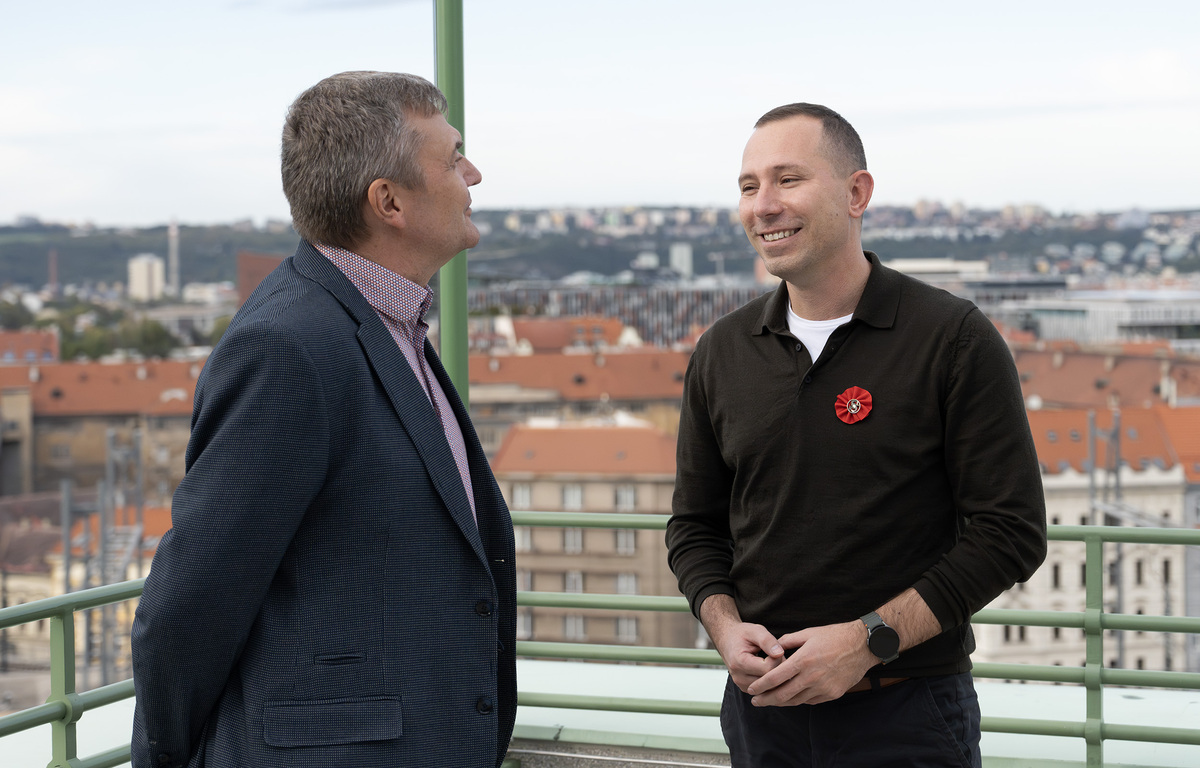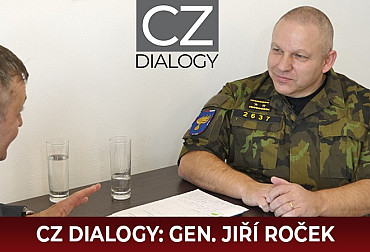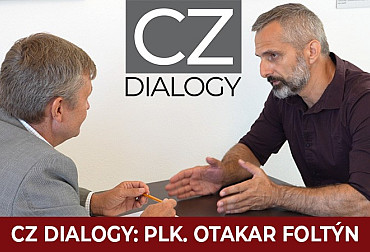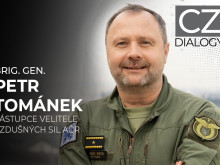Martin Chlumský: The primary goal is to equip a person with a sufficient level of fitness, not only physical but also mental
The Czech Sokol Community celebrated its 162nd anniversary. It played an irreplaceable role not only in the first years of its existence, but especially during the First World War when the Czechoslovak Legions were founded and then during the First Republic. During the occupation of Czechoslovakia during World War II, the Sokol members were again in the front line of resistance against the Nazi occupiers. Nor were they broken by post-war efforts to re-educate them socialistically in the post-war period. Today, Sokol is once again an organisation in its own right, with more than 160,000 members in thousands of units across the Czech Republic. It is headed by the recently elected mayor Martin Chlumský, who was another guest on our CZ DIALOGUES talk show. Not only did we talk about what all is going on in Sokol, but we also discussed how this organization can contribute to the needed resilience of the nation.
Video: Interview with the Mayor of the Czech Sokol Community Martin Chlumský / CZ DEFENCE
The history of the Sokol dates back to 1862. Two founders are also known, namely Dr. Miroslav Tyrš and Jindřich Fügner. Miroslav Tyrš was elected chief and Jindřich Fügner was historically the first mayor of Sokol. During its existence, the Sokol was banned more than three times. It contributed significantly to the establishment of the Czechoslovak Republic. Sokols participated in all the battles that took place in our republic historically. And of course, we must not forget the Sokol meetings, which are held every six years. The first one was held in 1882, 20 years after the Sokol was founded. And as Martin Chlumský adds, this first meeting was attended by over 700 men who trained and competed on Střelecký ostrov.
The development of Sokol was very dynamic and soon crossed the borders of the Czech lands of the former monarchy. "The idea of Sokol found appreciation among the Czech population thanks to its emphasis on patriotism, values and the pursuit of an independent Czechoslovak state. The idea therefore spread very quickly. Already in 1865, for example, the first foreign unity was established in America, in Saint Louis, then in Chicago, so the development was really very dynamic," recalls the mayor of Sokol.
An important milestone of the village is the role of Sokol in the assassination of the acting Reich Protector Reinhard Heydrich, for which a huge number of Sokol members and their relatives paid with their lives. "On the night of October 7-8, 1941, the Sokol action is well known, when more than 1,500 top officials from the counties, from the units, and from the headquarters were arrested. The great majority of them then ended up in concentration camps and did not live to see the end of the war. In response to these events, the idea of assassinating Reinhard Heydrich was born abroad. After the paratroopers had been dropped, the Sokols very often gave food vouchers or provided their own apartments for the paratroopers to stay in. All of this knowing that they and their families would face sanctions. In this respect, it was an incredible act of courage. Some families actually ended up on the execution ground, such as the Novák family," Martin Chlumský recalls in an interview the role of the Sokol members during the German occupation.
The number of members and individual units shows that the importance of Sokol in Czech society is great and, according to Chlumský, its pre-war contribution is also making a comeback. "If we look at how the rallies have developed since 1990, we can really see that the membership base is much more connected to the basic ideas of Sokol. They are much more aware of the patriotic meaning and the importance of Sokol as such. It's not just about going to Sokol, but being a Sokol. In this, I think we connect with the pre-1948 era," says Chlumsky, adding that the connection between sporting and intellectual perceptions stands on three pillars. "Firstly, it's a sport for everyone and really the offer is for all ages. The second part is performance sport, which the CSO often represents. The third area - and this is where the Sokol is unique - is the emphasis on culture, on education, on mental care and on promoting patriotism," the CSO mayor said.

"The moment we gained independence, the Czechoslovak Republic was here, so the primary goal was fulfilled. The attitude of the Sokol was then related to a specific time. And whenever the republic was threatened in some way, the Sokols always took a stand. The Sokol remains in this setting," says Martin Chlumský, who believes that in the event of a threat to national values, the Sokols would once again lead the way.
The basis of Sokol's work is versatility. "In order for our organism to develop in the best possible way, people need to try as many stimuli as possible. It's not just gymnastics, it's being outdoors, athletics and also swimming. And of course, some modern and unconventional sports are also important," Chlumský describes the system of work. The primary goal is to equip a person with a sufficient level of fitness, not only physical, but let's say also mental. The aim of the work of the Sokol is to keep the individual as active and active as possible for as long as possible. Here the efforts of the Sokol are approaching the return of what is now called a resilient society - strong not only physically but also mentally. "I will go back to the very beginning, Mr. Tyrš has already thought about this. He said - in a healthy body a healthy spirit. He was very much influenced by Darwinism. He saw nations and their survival through this lens. Only those nations that are healthy, active and strong in all aspects have a chance to survive," explains Martin Chlumský, the concept of the founders of Sokol. Tyrš said, "A nation does not have to be large in numbers - if its individual members are strong, then the nation has a chance of survival."

"The events that are happening a few hundred kilometres away from us now are indicative of how society will function, whether people are really resilient not only physically but also mentally. And that is what I think the Sokol is heading towards," Chlumský said. That is why cooperation with the Czech Army is also important. In this respect, there is a memorandum of cooperation with the Ministry of Defence and a memorandum of cooperation with the Castle Guard. The cooperation then takes place on several levels. "For example, our Sokol Guard trains with the Castle Guard, where it is part of the orderly training. And then we cooperate with the army very often during Sokol rallies, when they help us with providing medical assistance, for example. We meet regularly at commemorations. And last but not least, we are involved quite intensively in POKOS, which are programmes to prepare citizens to defend the state," the mayor of Sokol describes the cooperation. His plans also include the participation of army trainees in all-Sokol rallies. The army regularly took part in these exercises until 1948. Back then, besides our army, allied armies, for example from Romania or Yugoslavia, also participated. "There would certainly be something to build on. The truth is that today, of course, it is many times more difficult in terms of organisation and support in general," Chlumský says. However, given the spread of the Czech Sokol movement, we can see foreign practitioners at rallies, of which there are a large number around the world.
In the near future, the Sokol leadership should look into supporting small units, of which almost fifty percent are now in small communities. It is also about saving more than 700 properties across the country. "And when you have a small unit, there are twenty members, and you have a Sokol hall that needs millions, sometimes tens of millions of crowns for reconstruction, it's very often a desperate struggle to save them," Martin Chlumský, the current mayor of the Czech Sokol Community, plans his work efforts for the next elections, which will take place in eight months.
If you listen to the full interview at the beginning of the article, you will also hear how it was with the restart of Sokol, how it is possible that it survived socialism or how to become a Sokol member even at an older age.





















